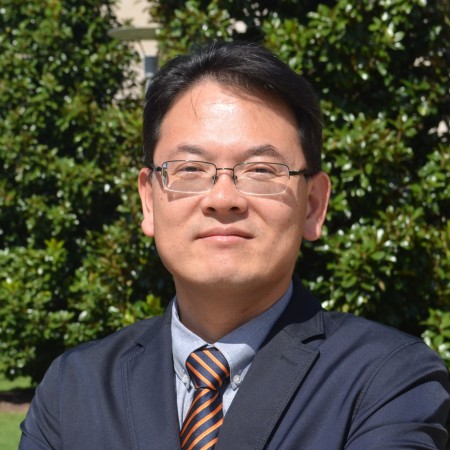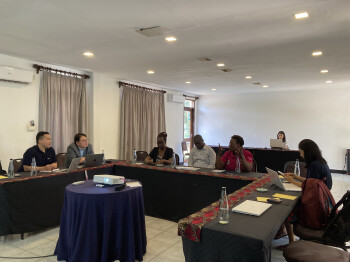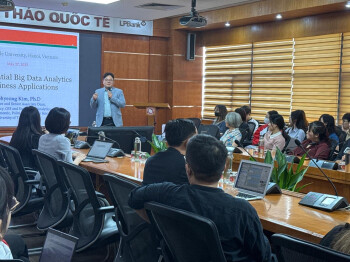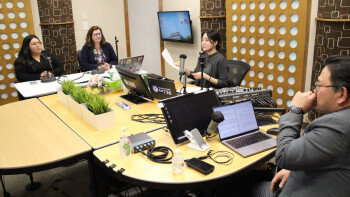Postdoctoral Research Associate - Environmental Health/Global Health
Duke University - 2008

Dohyeong Kim
Senior Associate Dean of Graduate Education
Professor of Public Policy, Geospatial Information Sciences & Social Data Analytics and Research
Team Lead, Spatial Health AI Research Partnership
Professional Preparation
Ph.D - City and Regional Planning (Health Planning)
University of North Carolina at Chapel Hill - 2007
University of North Carolina at Chapel Hill - 2007
M.A - Public Administration
Yonsei University, Seoul - 1999
Yonsei University, Seoul - 1999
B.A - Public Administration
Yonsei University, Seoul - 1996
Yonsei University, Seoul - 1996
Research Areas
Global Health and Safety
Geospatial Health and Public Policy
Environmental Health and Disaster Planning
Spatiotemporal Big Data Analysis and Machine Learning
Publications
Geospatial Analysis of Community-Level Social and Environmental Barriers for Adult Burn Injury Survivors in North Texas 2025 - Journal Article
Revisiting the joint effect of temperature and relative humidity on airborne mold and bacteria concentration in indoor environment: A machine learning approach 2025 - Journal Article
Area‐Specific Assessment of Stratum Corneum Hydration and Transepidermal Water Loss in Pediatric Patients With Atopic Dermatitis 2025 - Journal Article
mHealth Intervention Integrating Personal PM2.5 Monitoring and Deep Learning to Reduce Pediatric Asthma Exacerbations: Pilot Study (Preprint) 2025 - Other
Geospatial analysis of community-level social and environmental barriers for adult burn injury survivors in North Texas 2025 - Journal Article
Artificial Intelligence during a Public Health Crisis: A Trend Analysis of COVID-19 Research 2025 - Journal Article
Enhancing Particulate Matter Estimation in Livestock-Farming Areas with a Spatiotemporal Deep Learning Model 2024 - Journal Article
Awards
Award of Appreciation - Asia Disaster Preparedness Center (ADPC) [2024]
President's Teaching Excellence Award - UT Dallas [2023]
Best Article Award - Asian Association of Crisisonomy [2022]
Teaching Award for Distinguished Graduate Teaching - UT Dallas School of EPPS [2020]
Award of Appreciation - UTD Korean Student Association [2018]
Outstanding Teaching Comet Award - University of Texas at Dallas [2014]
Award of Appreciation - NCCU MPA Class of 2013 [2013]
Research Fellow - Institute for Poverty Alleviation and International Development [2011]
New Investigators in Global Health (NIGH) Award - Global Health Council [2008]
Superior Graduate Student Award - SBS Seo-Am Academic Foundation [1998]
Appointments
Assistant to Associate Professor
North Carolina Central University [2008–2013]
North Carolina Central University [2008–2013]
Postdoctoral Research Associate
Duke University [2005–2008]
Duke University [2005–2008]
Research and Teaching Assistant
University of North Carolina at Chapel Hill [2000–2005]
University of North Carolina at Chapel Hill [2000–2005]
Projects
Geospatial Community Mapping to Assess Social and Environmental Barriers and Facilitators for Burn Survivors (funded by National Institute on Disability, Independent Living, and Rehabilitation Research)
This project combines GIS-based spatial mapping of burn survivors’ community integration outcomes with qualitative approaches such as focus groups and interviews to identify and understand social and environmental barriers and facilitators, thereby guiding targeted interventions, resource allocation, and policy for improved long-term recovery and participation.Geospatial Analysis on the Impact on nurse and midwife training in maternal and child oral health in Kilifi County (funded by KOICA)
This project conducts a GIS-based analysis in Kilifi County, Kenya to evaluate how training nurses, midwives, and other primary healthcare providers in maternal and child oral health could improve service accessibility and reduce disparities. By mapping health facilities, population distribution, and travel networks, and comparing service areas before and after workforce capacity building, the study aims to generate evidence for strengthening oral health integration into Kenya’s primary healthcare system.Wearable device-based Development of Receptor-centered Exposure-health Assessment Methodology and Platform (funded by Korea Environmental Industry and Technology Institute)
This project develops a wearable device–based environmental health monitoring platform that integrates real-time biosignals (e.g., lung sounds, skin moisture, oxygen saturation) with indoor and outdoor environmental exposure data to predict and prevent environment-related diseases such as asthma, COPD, and atopic dermatitis. By combining IoT sensors, AI-driven machine learning algorithms, and Living Lab clinical validation, it aims to establish a personalized, preventive health management system that can be applied to vulnerable populations and inform evidence-based environmental health policies.Development of Data-Driven Disaster Information Modeling Platform by Analyzing Multifaceted Causal Analysis of Special Disaster Areas (funded by National Research Foundation of Korea)
This project aims to systematically analyze the causes and impacts of major social disasters in Korea by examining structural and institutional failures across cases such as ferry sinkings, building collapses, and large-scale fires. Using a multidisciplinary and mixed-methods approach, it seeks to propose innovative disaster management policies that enhance community resilience, improve victim support systems, and restore public trust in government.Interventional Study to Prevent Exacerbation of Atopic Dermatitis by Exposure to Particulate Matter (funded by Korean Center for Disease Control)
This project investigates the relationship between fine particulate matter (PM2.5) exposure and atopic dermatitis (AD), aiming to identify risk factors, biological mechanisms, and effective prevention strategies. By integrating clinical, environmental, and biomedical data with advanced analytical methods, it seeks to develop scientific evidence and policy guidance to reduce environmental health risks and improve quality of life for vulnerable populations.News Articles
Cash Saver closes in West Dallas, challenging ‘food desert’ area
 Dr. Dohyeong Kim, Professor of Public Policy, GIS and Social Data Analytics and Research, shared his insights in The Dallas Morning News on the recent closure of a Cash Saver grocery store in West Dallas. He explained that grocery stores in underserved neighborhoods do more than provide food. They anchor local economies, create stable jobs, and ensure residents have consistent access to nutritious options. According to Dr. Kim, the loss of a full-service grocery store increases the burden on residents, especially those facing transportation challenges, and can have direct effects on rates of chronic illnesses.
Dr. Dohyeong Kim, Professor of Public Policy, GIS and Social Data Analytics and Research, shared his insights in The Dallas Morning News on the recent closure of a Cash Saver grocery store in West Dallas. He explained that grocery stores in underserved neighborhoods do more than provide food. They anchor local economies, create stable jobs, and ensure residents have consistent access to nutritious options. According to Dr. Kim, the loss of a full-service grocery store increases the burden on residents, especially those facing transportation challenges, and can have direct effects on rates of chronic illnesses.
Geospatial Insights into Maternal and Child Oral Health Training in Kenya
 Dr. Dohyeong Kim and PPPE doctoral candidate Pyung Kim traveled to Kilifi County, Kenya, from October 12–20 to conduct a KOICA-funded research project analyzing the potential impact of capacity building among the primary health workforce in improving maternal and child health through strengthened oral care service delivery in the county.
Dr. Dohyeong Kim and PPPE doctoral candidate Pyung Kim traveled to Kilifi County, Kenya, from October 12–20 to conduct a KOICA-funded research project analyzing the potential impact of capacity building among the primary health workforce in improving maternal and child health through strengthened oral care service delivery in the county.
Researchers Explore How AI Tracks Breathing, Predicts Air Quality
 In two recent studies, University of Texas at Dallas researchers demonstrated how artificial intelligence (AI) and machine learning can be used to address a variety of issues from a social science policy perspective.
In two recent studies, University of Texas at Dallas researchers demonstrated how artificial intelligence (AI) and machine learning can be used to address a variety of issues from a social science policy perspective.Dr. Dohyeong Kim, a researcher in the School of Economic, Political and Policy Sciences (EPPS), and collaborators in South Korea have developed a wearable stethoscope that uses AI to monitor a patient’s breathing sounds for wheezing. Kim is also part of a team using machine learning to predict levels of airborne bacteria and fungi in indoor environments.
“In EPPS, we have multiple scholars working on AI issues,” said Kim, a professor of public policy, geospatial information sciences (GIS), and social data analytics and research, and senior associate dean of graduate education for EPPS. “AI applications have been primarily the domain of computer scientists or engineers, but it is getting more important to understand how AI can be applied in social science, health care, education, the environment and other areas.”
Kim and his colleagues previously developed a novel AI-based method for counting wheezing events in patients that can indicate breathing trouble that needs medical attention. The wearable stethoscope, described in a new article in the journal Engineering, is a wireless, skin-attachable, low-power device that includes a lung-sound monitoring patch (LSMP).
The LSMP monitors respiratory function through a mobile app and classifies normal and problematic breathing by comparing their unique acoustic characteristics. In the study, which included corresponding authors from South Korea, the LSMP sensor was tested in pediatric patients with asthma and elderly patients with chronic obstructive pulmonary disease (COPD).
The AI-based breathing-event counter was able to distinguish more than 80% of abnormal events, especially wheezing, in the COPD patients.
“In the previous study, we developed a method of training the algorithm with the wheezing sounds, but at the time we had not fully developed the wearable devices,” Kim said. “With the stethoscope fully developed, we can use this AI algorithm to automatically detect in real time whether the breathing sounds are normal. We can monitor and see the intensity and frequency of those wheezing sounds.”
In a related study, published in the Feb. 15 issue of the journal Building and Environment, researchers used machine learning to examine the combined effect of temperature and humidity on indoor bioaerosol concentrations.
“We found that we can use the temperature and humidity as a good predictor of the potential presence of bacteria and mold,” Kim said.
Exposure to airborne bioaerosols, such as bacteria and fungi, presents significant health risks, especially for vulnerable populations like children, the elderly and those with compromised immune systems. Bioaerosol exposure can aggravate respiratory and allergic conditions, underscoring the need for real-time monitoring in indoor environments.
Dr. Dohyeong Kim Explores Academic Partnerships in Vietnam
 Dr. Dohyeong Kim, Senior Associate Dean of Graduate Education at EPPS, visited Hanoi, Vietnam from May 26 to June 6, delivering a series of keynote lectures to faculty and students at Foreign Trade University and Vietnam National University. During the visit, Dr. Kim also discussed partnerships in various areas—including dual degree programs, student exchange, and research collaboration with the leadership of each institution.
Dr. Dohyeong Kim, Senior Associate Dean of Graduate Education at EPPS, visited Hanoi, Vietnam from May 26 to June 6, delivering a series of keynote lectures to faculty and students at Foreign Trade University and Vietnam National University. During the visit, Dr. Kim also discussed partnerships in various areas—including dual degree programs, student exchange, and research collaboration with the leadership of each institution.
EPPS Showcases UT Dallas on Dallas Korean Radio
 On March 21, Dean Jennifer Holmes, Senior Associate Dean of Graduate Education Dr. Dohyeong Kim, and Assistant Director of Admission Andrea Rivera were featured on a live broadcast with Dallas Korean Radio and DK Net (dalkora.com).
On March 21, Dean Jennifer Holmes, Senior Associate Dean of Graduate Education Dr. Dohyeong Kim, and Assistant Director of Admission Andrea Rivera were featured on a live broadcast with Dallas Korean Radio and DK Net (dalkora.com).Hosted by Joohyun Kim, the segment highlighted what sets UT Dallas—and specifically the School of Economic, Political and Policy Sciences—apart, from academic excellence to transformative student opportunities.
The program aired live from 11 a.m. to noon at the Dallas Korean Radio Station and was conducted primarily in Korean for the station’s audience, with Dr. Kim providing live translation.
Watch the full interview here: https://youtu.be/T387sK8Mjjc
Affiliations
Advisory Board Member
2023/04DK Foundation
Vice President
2023/01Korean Association of Disastronomy
Chairperson, International Affairs Committee
2023/01–2023/12The Korean Association for Policy Studies
Member of National Election Commission Overseas Voting
2022/01–2024/06Republic of Korea
Chair
2020/06–2022/05ASPA Section on Korean Public Administration, American Society for Public Administration